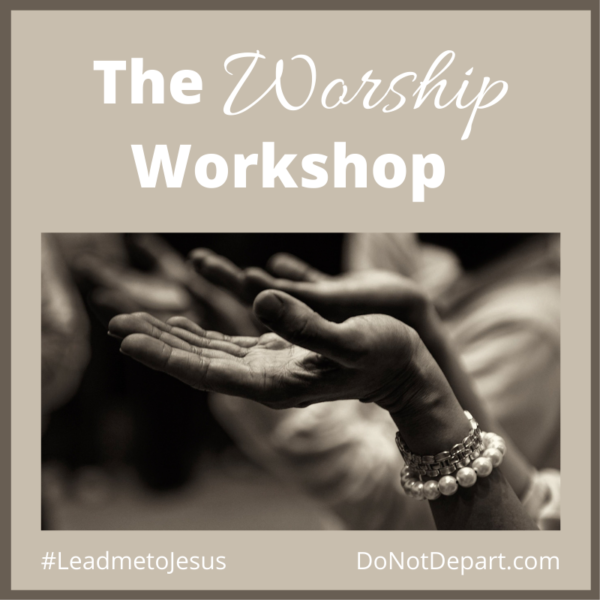This evening didn’t go particularly well.
My husband is out of town, last week was hard, and the house was a mess after a particularly busy weekend. Honestly, all I wanted out of Sunday afternoon was to pull this house together and feel prepared for Monday. But by 6pm every counter was still piled high. And my attempts to involve the kids in attending to the mess were met with whining that pushed my every button.
As I asked the kids, again, to clear the dinner table, I began mentally rehearsing how I was going to tell them that no way was I serving dessert and doing Sunday night family devotions tonight. This is usually my husband’s routine, and they could wait for their Daddy to get home for “Devos and Dessert with Daddy” tomorrow evening. Frankly, by this point I was just as whiny as any one else.
But as I stood at the kitchen sink, facing all the dishes with my back to the kids, the words “just worship” came to mind.

One Monday morning last year, Peggy Gerst visited the Bible study I was attending and spoke on the topic of praise. Our handouts were titled “Worship Workshop.”
I scrambled to keep up as she read through Psalms and other Old Testament Scriptures, expounding on the meaning of the vast number of Hebrew words used to describe the ways God’s people worship.
The Act of Worship
Listening to the Scriptures, I was struck by what a physical act worship is. The Hebrew words convey posture and movement, voice and music, all extolling God with “extravagant love and extreme submission,” as Peggy put it.
“Why are you cast down, O my soul,
and why are you in turmoil within me?
Hope in God; for I shall again praise him,
my salvation and my God.” (Psalm 42:11)
“Praise” here is the Hebrew word yadah (Strong’s #3034), meaning to revere or worship with extended hands. Read through the verse again, this time holding in mind the image of the Psalmist’s posture in the second portion of the verse, with outstretched arms:
“Why are you cast down, O my soul,
and why are you in turmoil within me?
Hope in God; for I shall again praise him,
my salvation and my God.” (Psalm 42:11)
The English translation of Psalm 34:1 uses the same word “praise,” but the original Hebrew word is barak (Strong’s #1288). Barak describes kneeling in blessing or adoration. It’s a very different posture from yadah but it similarly magnifies the Lord in a posture of worship.
“I will bless the Lord at all times;
his praise shall continually be in my mouth.” (Psalm 34:1)
Tehillah (Strong’s #8416), on the other hand, is not a posture of the body, but rather the use of the voice that flows from a posture of spirit. It means to sing a song of praise or to laud, as in to publicly extol glory. Such worship from the godly is described as fitting and beautiful in Psalm 33:1:
“Rejoice in the Lord, you righteous ones;
praise from the upright is beautiful.” (Psalm 33:1, CSB)
As she read Scripture after Scripture, Peggy painted a picture before us of the active praise of God’s people: kneeling, singing, dancing, waving banners and shaking tambourines, proceeding in song before armies, shouting in triumph, and bowing in submission.
Praise is our response to victory (Exodus 15), our plan in despair (Psalm 42:11), and appropriate at all times (Psalm 34:1).
“Your Turn”
After I’d lost myself trying to keep up with Peggy’s notes on the expansive Hebrew vocabulary of praise, Peggy came the end of five pages of Scripture references and brought out the tambourines. We chuckled uncomfortably. She invited us to fix our hearts on the character of God and give Him our praise, maybe quietly bowed, maybe from a kneel, maybe in dance or with hands extended. It was a beautiful morning of professing the goodness, faithfulness, and holiness of God.
In the months since Peggy’s Monday morning “Worship Workshop,” I kept turning over in my mind what a prominent role praise plays in the Bible. I noticed that my family reads Scripture together and prays together, but we less frequently worship together aside from Sunday mornings. I began adding occasional songs to our evening family prayers (easily done with zero preparation thanks to YouTube videos with lyrics). I’ve made it a point to make praise a more consistent part of my day and of our family life.
And so tonight, when my nerves were fried and frankly a bit bitter, and I had no desire to feed these kids Sunday evening ice cream or lead them in family devotions, I took a deep breath and set aside the evening chores for a bit longer. I dropped my original plan to read aloud a Bible passage and discuss a Bible Project video. I didn’t have the bandwidth, anyways, for negotiations over whose turn it would be to read or to answer a question first. I simply chose a song we’d sung in Church this morning and invited the kids to have a bowl of mint chocolate chip and then join me in the living room for worship.
And, no surprise, turning our attention away from ourselves, from one another, and from the house worked out much better. With our hearts instead focused together on the goodness of God, declaring God’s faithfulness, something changed in our hearts and in our home. My children got a softer Mommy, and I got the refreshing big-picture reminder of what this life, and every moment within it, is all about.
Take a moment for worship to the King of your heart.
Maybe even grab a shaker or a tambourine ;)

Join the Discussion